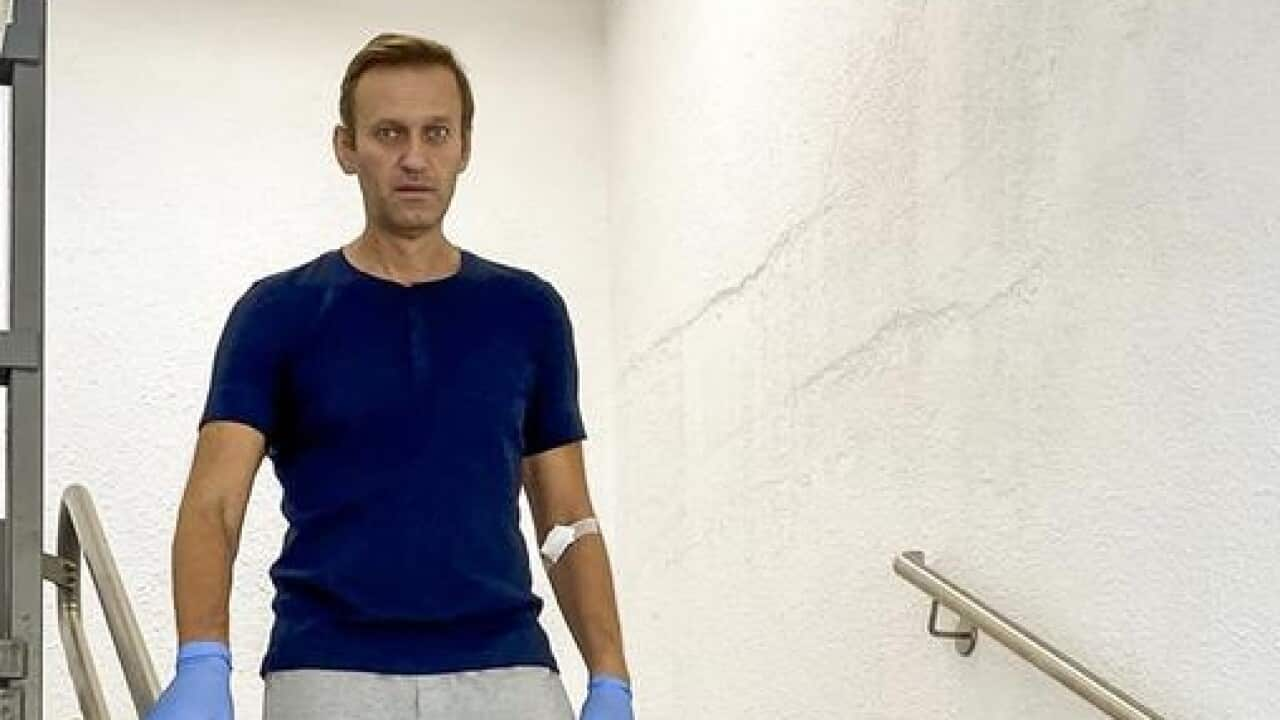Russian bailiffs put a freeze on opposition leader Alexei Navalny's flat and bank accounts days after his poisoning with a Novichok nerve agent, his spokeswoman said on Thursday.
The bailiffs' actions were the result of a court ruling in October 2019 that Mr Navalny, his ally Lyubov Sobol and the Anti-Corruption Foundation he founded should jointly pay almost 88 million rubles (AUD$1.6 million) to Moskovsky Shkolnik, a catering company that makes school dinners.
The company sued over a video investigation by Mr Navalny's team that alleged it made substandard food that made children ill.
The politician and anti-corruption campaigner's spokeswoman said in a video statement that on 27 August, "bailiffs announced a ban" on transactions involving his share in a flat in a Moscow suburb.
"At the same time, Alexei's accounts were frozen," Kira Yarmysh said. The legal move against Mr Navalny means his family's flat in a multi-storey block in southeastern Moscow cannot be sold, given as a present or used to take out a mortgage, Ms Yarmysh said. He can still live in the flat, however.
The legal move against Mr Navalny means his family's flat in a multi-storey block in southeastern Moscow cannot be sold, given as a present or used to take out a mortgage, Ms Yarmysh said. He can still live in the flat, however.

Alexei Navalny recently posted a photo from his hospital bed in Berlin. Source: Instagram
Political analyst Tatiana Stanovaya said the move could be part of a campaign by Russia to dissuade Mr Navalny from returning.
"Watch how they'll throw everything at stopping Mr Navalny's return," she said on social media.
On 20 August, President Vladimir Putin's top foe collapsed on a plane and was taken to hospital in Siberia for two days before being flown out to Berlin, where tests found he had been poisoned with Novichok, a Soviet-designed nerve agent.
The German hospital announced he had emerged from a coma on 7 September.
His allies and top international officials have said the onus is on Russia to prove that the poisoning was not state ordered and hold a proper investigation, while Russia argues it needs evidence from tests in Germany and other countries to do so.
Doctors at Berlin's Charite hospital said on Wednesday that Mr Navalny had been discharged. He will stay in Germany for now to continue treatment as an out-patient.
The Kremlin said Mr Navalny was free to return to Russia.
Foreign Minister Sergei Lavrov said on Thursday that Russia had asked Germany for "consular access" to Mr Navalny but this had not been granted.
He condemned "high-handed" international demands for "some kind of repentance" from Russia over the case.
Ms Yarmysh has told AFP that the politician intends to return to his home country, where he and his allies have been targeted with court cases and search warrants and have served brief terms behind bars.
Mr Navalny 'owes everyone'
Following the legal action against Mr Navlany, Kremlin-linked businessman Yevgeny Prigozhin said he had paid the catering company what it was due and would claim the money back personally.
After Mr Navalny was poisoned, he vowed to ruin him and his associates if he pulled through.
If Mr Navalny survived, Mr Prigozhin said he would be liable "according to the full severity of Russian law".
A statement posted on Thursday by the press service of his own catering company on social media quoted him as saying: Mr Navalny "owes everyone. He is practically on the run in Germany".
He said that he would let Mr Navalny sleep in the hallway "for cheap", while suggesting that he is "rolling in money".
Media reports have said Mr Prigozhin funds a shadowy mercenary group called Wagner that has fought in Syria and other conflicts, while he denies this.
He is nicknamed "Putin's chef" since his company has done catering for the Kremlin.
Ms Sobol said in late August that bailiffs debited all her bank accounts for her share of the sum, leaving her deep in the red.
To try and avoid paying the fine, the Anti-Corruption Foundation changed its legal status.












